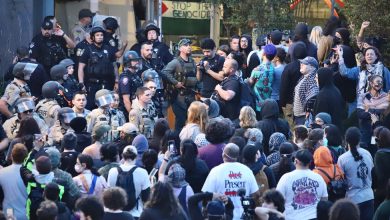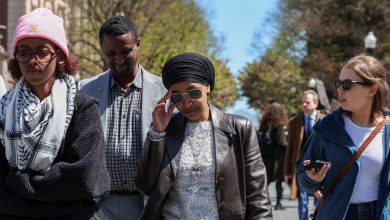Finally, the State Has a Budget Deal

Good morning. It’s Friday. Today we’ll look at the long-awaited proposed state budget and hear from the Manhattan district attorney, who said that his investigation into Donald Trump isn’t dead after all.

Credit…Cindy Schultz for The New York Times
Gov. Kathy Hochul has reached a deal with lawmakers on a $220 billion state budget after bruising battles that pushed negotiations nearly a week past the April 1 deadline.
Democrats in the Legislature tried and failed to block changes to the state’s bail laws, but won billions in spending to make child care more affordable.
My colleagues Luis Ferré-Sadurní and Grace Ashford laid out the broader tensions between legislators and the governor over how to respond to multiple crises, like the socioeconomic effects of the pandemic and increasingly dire projections of the impact of climate change.
Hochul, a Democrat, seeks to appeal to centrist voters before a gubernatorial campaign where public-safety issues are expected to be highlighted. Democrats to her left seek to help struggling workers, address inequalities and reduce fossil-fuel burning.
Exact figures won’t start emerging until all the legislation is introduced. For now, here are some highlights:
A stadium for the Bills
Prevailing over opponents who called the plan corporate welfare, Hochul won lawmakers’ approval for the largest public subsidy for a stadium in N.F.L. history. The deal with the Buffalo Bills, which she called necessary to keep them in western New York, puts in $600 million in state funds and $250 million from Erie County toward a new $1.4 billion stadium.
Economic measures
The budget includes hundreds of millions of dollars in tax cuts to ease the burden on New Yorkers grappling with skyrocketing gasoline prices, including suspending some state gas taxes from June until the end of the year.
The package aims to make hundreds of thousand more children eligible for subsidized child care by expanding subsidies to families earning up to three times the federal poverty level. It would provide $343 million to help child care providers strained by the pandemic and increase their reimbursement rates. It also would offer an additional $125 million for universal pre-K.
Other additional spending would increase wages for home care workers and expand health care coverage for undocumented immigrants.
Public safety
The budget proposes changes to a 2019 bail law that had made only the most serious crimes eligible for cash bail. Leaders in Albany say those changes aren’t to blame for an increase in crime in New York City but that the compromise deal will help, especially to reduce gun violence. New measures would change how some gun crimes are handled, allow arrests for certain repeated offenses and ease burdens on prosecutors to turn over material quickly to the defense.
There’s also new funding for mental-health services and provisions to expand use of Kendra’s law, which mandates treatment for mentally ill people found to pose danger to themselves or others.
Climate
The gas tax cuts riled some Democrats who want larger increases in spending to fight and prepare for climate change, especially because the budget deal left out an ambitious proposal Ms. Hochul supported to ban gas and oil hookups in new buildings starting in 2027. That move would have made New York the first state to stop adding oil- and gas-burning stoves and heaters and require new buildings to use only electricity.
But it did include a $4.2 billion environmental bond act to help finance projects meant to protect against climate change, and a commitment to make school bus fleets 100 percent electric by 2035.
Weather
It’s a mostly sunny day in the low 60s, with scattered showers late at night and temps dropping to the mid-40s.
alternate-side parking
In effect until Thursday (Holy Thursday).
A new Yankees season
The Yankees’ first game starts today at 1:05 p.m. at home. They’re playing the Red Sox.
Rain forecasts led to the postponement of the opening game, which had been scheduled for Thursday — adding a day to an off-season that had already been extended a week when Major League Baseball and the players’ union worked to negotiate a new collective bargaining agreement.
The rain delay also gave the Yankees an extra day to negotiate a contract extension with the outfielder Aaron Judge. Judge, who can be a free agent after this season, had said he would not negotiate with the team once games begin. No deal had been reached as of Thursday night.
The latest New York news
-
The New York attorney general, Letitia James, asked a judge to hold Donald J. Trump in contempt for failing to turn over documents related to her investigation.
-
Alfredo Oyague, an influential artist from the Bronx, died last week, just days before he had planned to bring together two crews to paint one last mural.
-
Kidd Creole, the founding member of Grandmaster Flash and the Furious Five, whose real name is Nathaniel Glover, was convicted of manslaughter in the death of a homeless man.
-
After the victory at Amazon by a little-known independent union that didn’t exist 18 months ago, organized labor has begun to ask itself a pressing question: Does the labor movement need to get more disorganized?
Manhattan D.A. denies he has quit investigating Trump
More than a month ago, the Manhattan district attorney, Alvin Bragg, rejected a plan to present a grand jury with charges against Donald J. Trump. The two top prosecutors leading the three-year investigation quit in protest, one warning in a resignation letter that not prosecuting the former president would be “a grave failure of justice.”
Now, Mr. Bragg has spoken on the issue for the first time, declaring that he is still pursuing the investigation and that prosecutors have recently questioned new witnesses and examined new documents.
Citing grand-jury secrecy rules, he declined to give more details or say whether he had developed a new theory that made him more confident of victory in the case, which centers on whether Mr. Trump committed a crime in inflating the value of his hotels, golf courses and other properties.
As my colleagues Jonah E. Bromwich, William K. Rashbaum and Ben Protess report, Bragg sought to address criticism that erupted when the resignation letter from Mark F. Pomerantz was published in The New York Times.
The letter said the investigation had been “suspended indefinitely” even though Trump was “guilty of numerous felony violations,” and that Pomerantz and the other prosecutor, Carey R. Dunne, had tried but failed to convince Bragg that the case could be won and should be brought regardless of outcome.
In a nearly hourlong interview at his office on Thursday, Mr. Bragg disputed Pomerantz’s account. But he did not address specifics about the progress of the investigation, saying only that he had not “shelved” any approach to the case, now led by another senior prosecutor, Susan Hoffinger.
He promised to announce any final decision he eventually makes on whether or not to indict Trump or others.
“I’m the district attorney,” Mr. Bragg said. “I own this decision.”
What we’re reading
-
Guadalupe Maravilla’s sculptures at the Brooklyn Museum and MoMA explore the trauma caused by war, migration and family separation.
-
Meet the 59-year-old exterminator and his trusty dog who, for more than a decade, have pursued/hunted/stalked bedbugs in New Yorkers’ bedrooms, office chairs and suitcases.
-
What we’re watching: Michael Gold, a transit reporter for Metro, will discuss the topic of unhoused people in the subway and the New York City Transit’s recently appointed president, Richard Davey, on “The New York Times Close Up With Sam Roberts.” The show airs on Friday at 8 p.m., Saturday at 1:30 p.m. and Sunday at 12:30 p.m. [CUNY TV]
METROPOLITAN diary
Birdsong
Dear Diary:
On Presidents’ Day, about three dozen people of various ages gathered at the Brooklyn Botanic Garden’s entrance for a family bird walk. You couldn’t have asked for better winter weather: sunny, not too cold, light breezes.
Our guide, a woman wearing a bucket hat decorated with colorful bird prints, made some preliminary remarks, and we were on our way.
“Yellow-bellied sapsucker,” she called out 10 minutes into the walk.
The group stopped in its tracks. Binoculars were raised, fingers pointed, sighting tips shared.
The other birds we encountered included a downy woodpecker, a Cooper’s hawk (a blue jay’s warning cries alerted us to its presence) and a white-throated sparrow camouflaged in a bush’s dense branches.
Toward the end of the walk, a bird somewhere ahead burst into song.
“Cardinal,” the guide announced, and the search began.
In the flurry of activity, I wondered whether anybody else was paying attention to the brilliant whistled tune.
“Isn’t the singing wonderful?” I asked, loud enough for everyone to hear.
At least one other member of the group, a man, heard me.
“Sounds like a car alarm to me,” he said.
— Roth Wilkofsky
Illustrated by Agnes Lee. Send submissions here and read more Metropolitan Diary here.
Glad we could get together here. James Barron will be back Monday. — A.B.
P.S. Here’s today’s Mini Crossword and Spelling Bee. You can find all our puzzles here.
Melissa Guerrero, Jeff Boda and Ed Shanahan contributed to New York Today. You can reach the team at [email protected].
.



